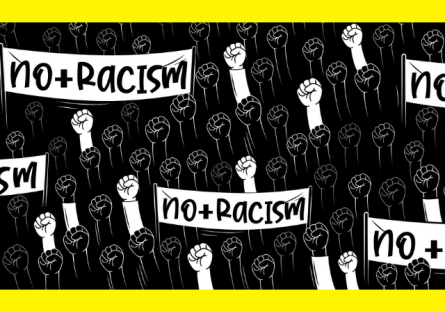
As unrest sweeps across the country in response to the deaths of several Black men and women at the hands of police, EMCC wants to make one thing clear: there is no room for racism on its campus. There never has been. The West Valley school has always prioritized efforts to promote diversity. It’s one of its five Core Values.
Of course, efforts to address racism and inequity have recently been enhanced with initiatives such as collegewide conversations and the formation of the Diversity, Equity, and Inclusion Task Force (DEIT). But the school has always celebrated diversity and strived to fight racism and advance opportunities for Black, Latinx/a/o, Native American and other people of color.
That is apparent in the number and popularity of such student clubs and organizations as the Black Student Union, M.E.CH.A. (Movimento Estudiantil Chicano de Aztlan), Male Empowerment Network, and P.R.I.D.E.
It’s also apparent in such programs as Hoop of Learning, an early high school bridge program that encourages Native American students to stay in school, graduate, and go to college, and ACE (Achieving a College Education), which targets students who may not think going to college and earning a degree is an achievable goal.
It’s apparent in the annual Hermanas Conference and the STEM Summer Bridge program, which introduce high school students of color to STEM fields and help make college a reality.
And it’s apparent during Black History Month, Hispanic Heritage Awareness Month, Native American Heritage Month, LGBTQ Pride Month when the campus is abuzz with special events and engagements.
But it’s more than that. It’s an intrinsic value that is cultivated and fostered right in the classroom.
“Racism is a very significant topic that I include in all of my courses,” Sociology Professor Dr. Olga Tsoudis said.
Dr. Tsoudis said it is important to discuss history, slavery, the irrational fear of the Black man, and the stereotype of the angry Black woman.
“As a faculty member, it is important for me to emphasize racism against African Americans,” she said. “We cannot forget the history that still impacts their lives today.”
Her courses focus on social change and she encourages her students to use their voices for change.
“This is the way to improve lives, be equal, and to be socially responsible in our community,” she said. “I would like to think that the Sociology courses result in critical thinking skills, empathy, and social responsibility. I hope this in turn results in an interest to be anti-racist when they leave the classroom, to use their voices, to look for solutions, to not condone racist behaviors.”
Psychology Professor Erica Wager hopes for the same outcome for her students.
“I hope that when we talk about things like this in the classroom, students then go home and talk about these things with their family and friends,” she said. “Part of our role as educators is to serve our students and try to create positive change in our society. Addressing anti-racism does both of those things.”
Professor Wager addresses racism in her classes in a variety of ways, focusing on research that was instrumental in the Civil Rights Movement, identifying ways that research was and often is still racist, and discussing how white privilege relates to psychological research, intelligence tests, language, stress, and health. Her students learn about bias, stereotypes, prejudice, discrimination, and racism, and how to confront them. She initiates class discussions by asking her students to reflect on events in their own lives when they experienced prejudice and discrimination, either as the victim or the aggressor.
“Inevitably, this leads to discussions of anti-blackness and racism more generally,” she said. “It can get very difficult for them to talk about, but it also leads to some of the most engaging in-class discussions.”
Dr. Lewis Brownlee, who teaches Introduction to African American Studies, begins his class by delivering Africa before European colonialism in the late 14th Century.
“I explain that all people are Africans because life began in the valleys and rifts of Africa,” he said. “Language, gods, culture, art, and technology all began with Africa. The notion in most college courses is that all knowledge began in Europe. This is not true. Cornel West argues that because of the structures of modern discourse based on Greek aesthetics, whites have been conditioned to treat Blacks inferior.”
He hopes his students leave his class knowing that race is a social construct, differing from nationality and ethnicity.
“Race is identified by specified physical features accompanied by fixed pathologies and behaviors,” he said. “These identifications are assigned to groups of people based on phenotype, which often mutate and change, they are not static.”
Several EMCC professors, including Drs. Brownlee and Tsoudis, have altered their classes in light of current events. Dr. Tsoudis expanded her syllabus to add a focus on Black Lives Matter as well as a discussion quote in each module that focuses on anti-racism and/or equality, and she’s already seeing positive results.
“I am seeing my students discuss racism more openly just from having to have a discussion on a specific quote,” she said, adding she hopes those discussions are catalysts for social change.
Professor Wager couldn’t agree more.
“I hope my white students leave the class with an understanding of white privilege and with a desire to fight racism,” she said. “And I hope my BIPOC (Black, Indigenous, People of color) students leave those lessons with the sense that they are heard and seen and with the knowledge that they have allies and advocates on this campus.”
It’s not too late to take Fall classes at EMCC. The college offers nearly 200 Flexible Start classes, which begin Oct. 19. Go to https://www.estrellamountain.edu/students/flexible-start-dates-classes-start-october-19 to learn more!